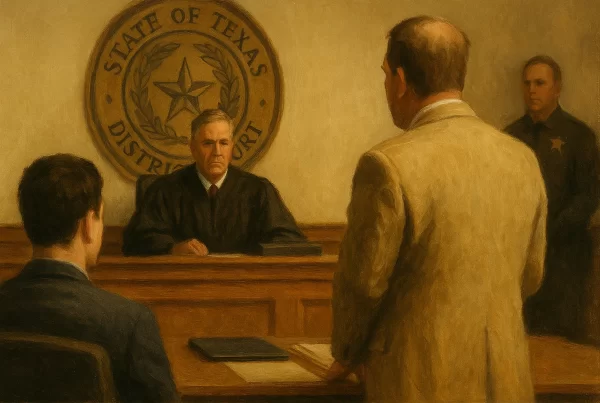District attorneys are the chief prosecutors representing the State of Texas in criminal cases in the courts, particularly cases involving serious crimes, such as murder, assault, robbery, drug trafficking, and felony drunk driving.
District attorneys are elected by voters and serve 4-year terms. Each district attorney serves a specific judicial district, corresponding with the boundaries of one or more counties.
District attorneys work closely with law enforcement to gather and review evidence of crimes. For this reason, they sometimes refer to themselves as “chief law enforcement officers.” Though they are not licensed peace officers, they are part of the law enforcement system in a broader sense.
Formally, district attorneys are part of the state judiciary, though their role is to enforce state laws through prosecution, rather than interpret the law or adjudicate, which is the responsibility of judges. District attorneys regularly appear before judges to present criminal cases. They are the key point of interface between law enforcement and the judges of the Texas judiciary.
As prosecutors, district attorneys seek to hold suspected criminals accountable for their crimes, securing convictions and punishments, such as jail time, prison, community service, or probation. However, the Texas Code of Criminal Procedure says that District Attorneys are supposed to seek justice, not necessarily just to win criminal convictions:1
“The primary duty of an attorney representing the state, including a special prosecutor, is not to convict but to see that justice is done. An attorney representing the state, including a special prosecutor, may not suppress facts or conceal witnesses capable of establishing the innocence of the defendant.”
Role in Criminal Cases
District attorneys handle criminal cases in all the state district courts and in appeals from those courts to appellate courts.
Specific tasks of districts attorneys include:
- Advise law enforcement on legal procedures and due process matters.
- Review police reports to determine if charges should be filed.
- Determine whether to dismiss cases due to lack of evidence.
- Draft and file formal charges in court.
- Present evidence to grand juries to obtain indictments in felony cases.
- Interview and prepare witnesses.
- Prepare evidence for trial.
- Negotiate plea deals with defense attorneys.
- Cross-examine defense witnesses.
- Recommend sentences and probation terms to judges.
- Argue appeals in appellate courts when necessary.
- Ensure compliance with due process rights.
- Assign cases to prosecutors and oversee case progress.
- Supervise junior prosecutors, investigators, and administrative staff.
- Manage the office budget, funding allocations, and resource distribution.
District attorneys generally do not handle misdemeanor criminal cases, which are prosecuted by county attorneys in county courts.
In a few counties, however, there is a combined office that prosecutes both misdemeanor and felony cases. For example, the district attorney in Nueces County also handles criminal cases in county and justice courts, according to Section 43.148 of the Texas Government Code.
Know the Difference
Texas district attorneys represent the State of Texas in state courts, prosecuting state crimes. They have a similar name and role to United States district attorneys (also called simply “U.S. Attorneys”), who prosecute federal crimes in federal courts. Texas is home to four federal court districts, each of which also has a federal district attorney’s office. One notable difference between U.S. district attorneys and State of Texas district attorneys is that the latter are part of the judiciary and are elected, whereas their federal counterparts fall within the executive branch and are appointed.
Role in Family Law Cases
In addition to their primary role as criminal prosecutors, District Attorneys play a role in certain family law cases. Specifically, they may represent the Department of Family and Protective Services in child protection cases.2 They also can they can act on behalf of victims in cases of domestic violence, by asking courts to issue protective orders.
Geographic Jurisdiction
A district attorney (DA) in Texas has jurisdiction over one or more counties, depending on the size of the judicial district in which he serves. The specific geographic jurisdiction of the district attorney generally corresponds with a district court’s boundaries, but in some cases district attorneys prosecute cases in more than one judicial district.
State law, specifically Chapter 43, Subchapter B of the Texas Government Code (“Provisions Applicable to Specific Districts”), specifies the geographic jurisdiction of different district attorneys throughout the state. For example, voters of Blanco, Burnet, Llano, and San Saba counties elect a district attorney to represent the state in two courts covering those four counties, the 33rd and 424th Judicial Districts.

Qualifications for Office
Candidates for district attorney must meet the following qualifications at the time of their appointment or election:3
- U.S. citizen
- resident of Texas for at least 12 months
- resident of the district for at least six months
- registered to vote in the district
- at least 18 years of age
- licensed and practicing lawyer or judge
- not convicted of a felony.
Prosecutors and Staff
District attorneys typically don’t carry out their work alone. They hire assistant district attorneys, investigators, paralegals, legal secretaries, and other specialists.
The largest district attorney’s offices in Texas have several hundred staff.
Vacancies and Removals
If a vacancy arises in a district attorney’s office, the governor may appoint a new district attorney to serve until the next general election.4
Under the Texas Constitution (art. V sec. 24) and Local Government Code (ch. 87), a district attorney may be removed by a district judge, after a jury trial, on grounds of “incompetency, official misconduct, habitual drunkenness,” or “intoxication on or off duty.”
Any resident of the attorney’s judicial district who is not under indictment may file a petition in district court seeking removal of the district attorney. The judge has sole discretion whether toact on the petition and move forward with a trial.5
If the judge does set a trial, then the judge may temporarily suspend the DA and appoint another person to perform the duties of the office pending trial.6
During the trial, the county attorney is responsible for prosecuting the case. But if both the county attorney and DA are subject to a pending removal proceeding, then a county attorney from a neighboring county, as selected by the commissioners court, may represent the state.



